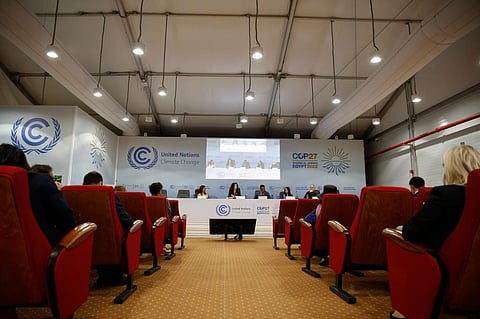

The 27th Conference of Parties (COP27) to the United Nations Framework Convention on Climate Change in Sharm El-Sheikh, Egypt, began November 7, 2022. Finance dominated discussions on day four of COP27 climate talks. Here’s a look at what happened.
Developed countries like the United Kingdom, the United States, the European Union and Australia acknowledged that there is currently a funding gap in addressing loss and damage, at an informal consultation on loss and damage finance November 10, 2022 during COP27.
They added that they are open to discussing innovative options to scale up funding both within or outside of the UNFCCC.
Developing countries are keener to have the finance facility established within UNFCCC. “The UNFCCC initiatives are framed in the context of obligation of historical responsibility,” Bolivia said.
Several developed countries also spoke of starting a “process” to run till 2024 to identify gaps and possible solutions.
But developing countries said they do not want a long process. They demand the outcome of COP27 be the establishment of a finance facility.
Discussions will continue on November 11 to identify the next steps.
.............................................................................................................................................................
Proposed, approved and under-construction liquefied natural gas (LNG) production projects in the pipeline from 2021 to 2050 could consume 10 per cent of the remaining global carbon budget for 1.5 degrees Celsius warming by 2050, according to a new report released at COP27 November 10, 2022.
Massive gas expansion risks overtaking positive climate policies report was released by Climate Action Tracker (CAT).
.............................................................................................................................................................
A draft text was produced after the initial discussion on the Mitigation Work Programme. Deliberations on the many points of disagreement continued.
Argentina commented on the length of the text that went on for nine pages, with 51 activity items in the annex. The EU highlighted that the role of non-Party stakeholders should be mentioned in the text. India requested that its proposal on sustainable lifestyles be considered in the annex.
.............................................................................................................................................................
“Affordable power is key for developing countries like India. This has been hindered by the Russian war, which has pushed the clean energy transition backwards and increased India’s use of dirtier fuels,” said Sunita Narain, director-general of the Centre for Science and Environment, a Delhi-based non-profit. She was speaking at a side event at the International Emissions Trading Association Business Hub on climate progress during an energy crisis.
.............................................................................................................................................................
A side event was held on the financial needs of developing countries a day after a new report estimated that developing and emerging economies need $2 trillion in climate funds.
Developing countries raised concerns about the current climate finance of $100 billion a year, saying that the funds that are made available take years to reach their treasury.
“We have failed to finance mitigation and adaptation. The longer we reach on meeting the agreement, the costlier it will be to address loss and damage,” Aminath Shauna, Maldives minister of environment, climate change and technology, said at the event.
.............................................................................................................................................................
Scientists from various global institutions announced 10 new insights into climate science as part of a UNFCCC side event at COP27 on November 10. These were on the following themes:
.............................................................................................................................................................
The Glasgow Sharm El-Sheikh Work Programme on Global Goal on Adaptation’s fourth workshop concluded without a consensus on a global definition of what adaptation means and how it can be measured.
Many countries wanted to involve the Intergovernmental Panel on Climate Change (IPCC) to understand adaptation better and decide upon key indicators of assessing progress on planning, implementing and financing adaptation.
.............................................................................................................................................................
Francine Baron, minister of foreign affairs of Dominica, at a UNFCCC side event highlighted that countries who have historic responsibility for greenhouse gas emissions should pay for loss and damage.
She said that whatever finance mechanism is decided upon under the loss and damage finance facility should be easily accessible for the most vulnerable countries.
At the same event, Michai Robertson, lead negotiator for Alliance of Small Island States, said that climate pledges related to loss and damage finance should be considered with caution as such pledges are rarely met.
Most of the loss and damage negotiations are stuck in creative language, which is extremely disrespectful for countries bearing the brunt of climate change, he pointed out.
.............................................................................................................................................................
The CoP27 summit attracted 636 fossil fuel lobbyists, 100 more than last year, according to the group Kick Big Polluters out.
“Fossil fuel lobbyists are working openly through a number of country delegations, pushing back against calls to curtail the fossil fuel industry,” the group wrote on their website.
.............................................................................................................................................................
Sharm el-Sheikh could be the second-most well-attended climate COP in history, with a delegation of close to 33,000, analysis from Carbon Brief revealed. Of them, 63 per cent were male and 37 per cent female.
United Arab Emirates, with 1,073, had the biggest contingent, followed by Brazil (574), the Democratic Republic of Congo (459), Kenya (386) and Canada (377), the analysis revealed.